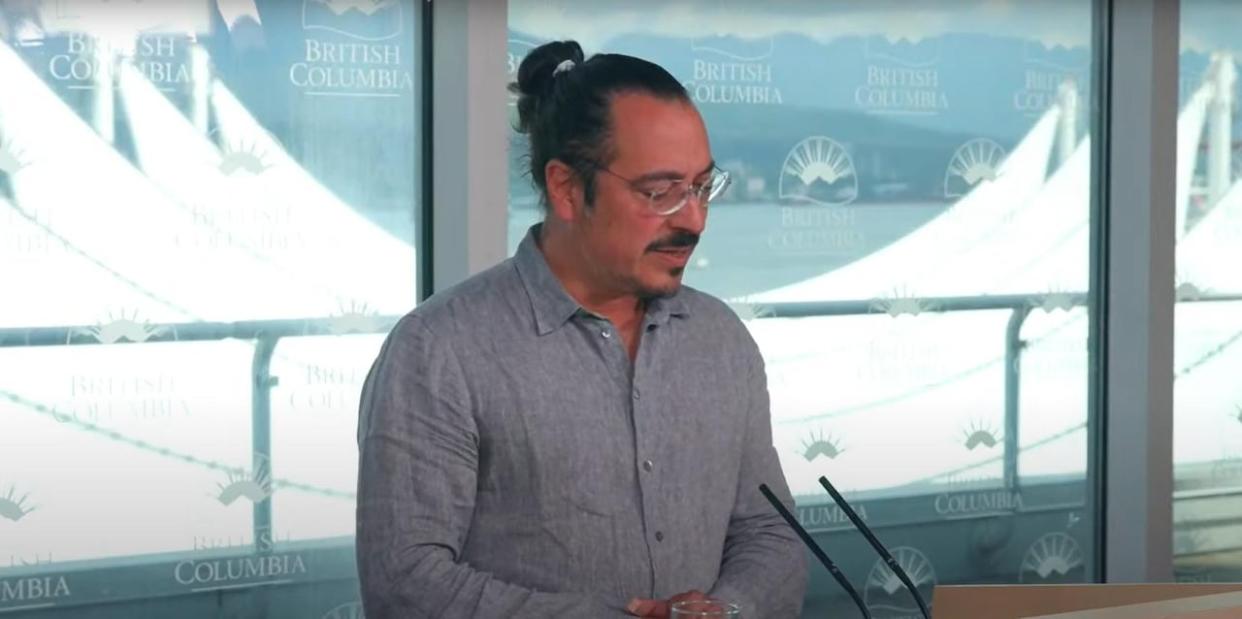Chief scientific adviser for psychiatry, toxic drugs announced

The province is bringing in a new scientific adviser to look into mental health and addiction treatment in B.C. and offer recommendations for government to improve care.
On Wednesday, Premier David Eby announced that Dr. Daniel Vigo, a psychiatrist and assistant professor at the University of British Columbia (UBC), will be taking on the role of chief scientific adviser for psychiatry, toxic drugs and concurrent disorders, effective immediately.
In his new position, Vigo will look at what kind of treatment is available for people with complex mental health and addiction care requirements and offer advice on how to make that treatment better. He'll work closely with Provincial Health Officer Dr. Bonnie Henry, the province said, as well as health authorities, Indigenous groups and people with lived experience.
"We'll continue to be guided by evidence, not ideology, because we won't play politics with people's lives," Eby said.
More than 14,400 people — including at least 126 children and youth — have died in B.C. as a result of toxic drugs since a provincial public health emergency was declared in April 2016. Indigenous people continue to be disproportionately affected by toxic drugs.
"That is, unfortunately, the tip of the iceberg," Eby said.
Vigo described the toxic drug situation in B.C. as a "simmering crisis," one that's been growing worse every day, adding that the potency of synthetic drugs has grown "exponentially."
"Every child, youth and adult in our community is now at risk," he said. "Every street drug is potentially contaminated."
'Triad' of challenges
The province said there are an increasing number of people who are dealing with brain injuries after surviving a toxic drug overdose. While half of survivors die shortly after, the care for those who do survive, as well as next steps, can be complicated, Vigo said.
What happens, he explained, is that people end up with severe mental illness, substance use disorder and an acquired brain injury.
"This triad, which went from a few hundred in 2013 to thousands today, presents with various degrees of behavioural disturbances," Vigo said.
Eby said addictions physicians in B.C. are struggling to support people with that trio of diagnoses.
Vigo said brain injury often means that people lose functions required to engage in care and treatment, and they have difficulty controlling impulses and determining what actions are or aren't in their best interest.
"That presents an enormous challenge," he said.
When asked for more information about his background, his position on safe supply and what his first recommendation might be, Vigo only said he was starting the job immediately and would be taking time to make recommendations.
The province has declined all interview requests for Vigo "for the foreseeable future."
Information from online biographies show that aside from his work with the province and UBC, Vigo is also a lecturer at Harvard Medical School and an advisor to the World Health Organization.
His research at UBC includes projects around needs-based planning for mental health and substance use disorder, and online delivery of mental health resources and care, also known as e-mental health.
Province under scrutiny
This news comes as the B.C. NDP government and its mental health and addictions programs have been under fire from people on all sides of the political spectrum in recent months.
In particular, the province's approach to the toxic drug crisis and people living with addiction has been criticized.
In March, B.C.'s auditor general determined that two government programs aimed at curbing the death toll from the crisis were not "effectively implemented" by the ministries of health and mental health and addictions.
In April, the province rolled back the drug decriminalization program it announced in January 2023, once more giving police the ability to seize drugs and arrest people using them in spaces like parks, bus stops and hospitals.
While some believed this was the right move, others felt it would put lives at risk.
Meanwhile, the safer supply program in B.C., designed to offer drug users non-toxic, prescription alternatives to potentially poisoned illicit drugs, has also drawn mixed reaction.
A provincial election is scheduled for October 2024.
Eby said the work Vigo will be doing is "critical."
"We're working within a health-care system that needs to respond to these realities," he said.
"This is not a controversial initiative. It's just something that needs to be done."


